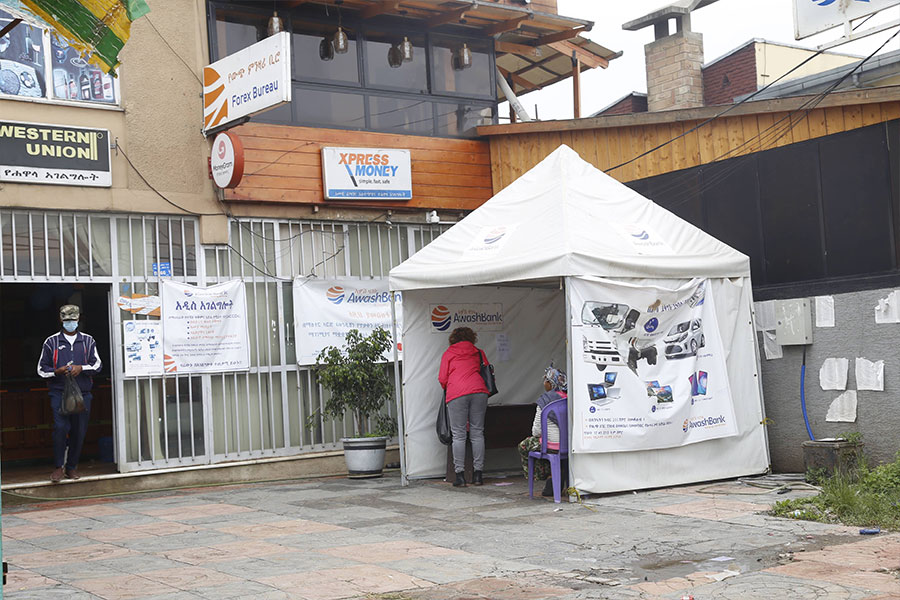
Radar | May 25,2019
Feb 12 , 2022
By SAMUEL BOGALE ( FORTUNE STAFF WRITER
)
The Ethiopian Shipping & Logistics Services Enterprise (ESLSE) has beefed up container guarantee deposits by as much as 66pc and cut container returning periods for importers by five days, shortening the grace period by three days. Its executives blame importers' reluctance to offload cargo and return leased containers in time.
The guarantee deposit for 20ft containers has jumped by 50pc to 15,000 Br while importers will have to deposit 25,000 Br for 40ft, an increase of two-thirds.
The Enterprise's executives refrained from confirming the updated requirements, but cited that changes are forthcoming.
Importers and freight forwarders have long been complaining about lengthy customs procedures. Although they would prefer not to hold on to the containers for long, they argue it is challenging to complete the process within the timeline. Importers are charged 400 Br for 20ft containers and over 900 Br for 40ft containers that stay at dry ports for up to a month after arrival. They cede the amount to the Enterprise if the containers remain at dry ports for up to three months and are compelled to make additional deposits for more extended periods. They also need more days to settle customs requirements and unload merchandise before returning containers to dry port facilities.
The Enterprise is subjected to fees in demurrage from companies it leases containers from. Importers' reluctance to offload cargo quickly and return containers in time forced the Enterprise to tighten the rules, says Wondwossen Kasa, acting deputy CEO for the shipping service sector.
“We'd prefer importers to unload their cargo at dry ports and return the containers to us on the spot,” Wondwossen told Fortune.
A global logistics disruption beginning two years ago has led to a shortage of containers that shot up prices. As lockdowns and restrictions began to take hold worldwide in the wake of COVID-19, factories in China, which accounts for over 90pc of the market share, were shut down. Surged demand in e-commerce and online shopping led to a massive backlog, causing an overcrowded shipping industry when the factories resumed production as the effects of the pandemic subsided.
The scarcity provoked outcries from importers, who reported their goods were stranded, particularly in Chinese ports, due to shortages of containers.
The Enterprise was compelled to acquire close to 6,000 containers over the past six months, bringing its total stock to around 10,000. It spent an average of 7,000 dollars (40ft) and 4,000 dollars (20ft) for each container. The ESLSE is still faced with a shortage.
“Not only are containers expensive, but they're also not easily available to buy,” said Wondwossen.
Containers go through assessment procedures conducted based on the importer's track record after they arrive at dry ports and before they are issued with clearance and assigned colour-coded passes. Containers that receive red passes are subjected to a series of security checks that further extends process. Importers also raise concerns over bureaucratic snags and inefficiencies at federal agencies from where they are required to collect supporting documents.
According to a freight forwarder who requested anonymity, three days is not enough unless customs services are sped up, and the procedures made more simple.
Samuel Tsegaye, a freight forwarder at MACCFA Freight Logistics Plc, a company that offers a range of services from customs clearing to door-to-door services, is more optimistic.
“If all goes well, the shortening of the grace period to three days is not a big deal,” Samuel said.
Experts urge the solution to the problem lies in developing more coordinated systems between public service providers. Yitawork Ewnetu, a logistics expert with over a decade of experience, observes that the ESLSE tightening requirements will not make much of a dent unless customs officials pick up the pace on their procedures.
"Only collaboration between customs authorities and the shipping company can solve the problem,” he said. “Modernising customs services might help address the issues to some extent."
The Customs Commission began digitising customs services two years ago, introducing automated systems and enabling users to access services online. However, the project lags in the trial phase.
PUBLISHED ON
Feb 12,2022 [ VOL
22 , NO
1137]

Fortune News | Apr 04,2020

Radar | May 14,2022

Fineline | Apr 25,2020

News Analysis | May 11,2025

Agenda | Jul 18,2021

Dec 22 , 2024 . By TIZITA SHEWAFERAW
Charged with transforming colossal state-owned enterprises into modern and competitiv...

Aug 18 , 2024 . By AKSAH ITALO
Although predictable Yonas Zerihun's job in the ride-hailing service is not immune to...

Jul 28 , 2024 . By TIZITA SHEWAFERAW
Unhabitual, perhaps too many, Samuel Gebreyohannes, 38, used to occasionally enjoy a couple of beers at breakfast. However, he recently swit...

Jul 13 , 2024 . By AKSAH ITALO
Investors who rely on tractors, trucks, and field vehicles for commuting, transporting commodities, and f...

Jun 28 , 2025
Meseret Damtie, the assertive auditor general, has never been shy about naming names...

Jun 21 , 2025
A well-worn adage says, “Budget is not destiny, but it is direction.” Examining t...

Jun 14 , 2025
Yet again, the Horn of Africa is bracing for trouble. A region already frayed by wars...

Jun 7 , 2025
Few promises shine brighter in Addis Abeba than the pledge of a roof for every family...